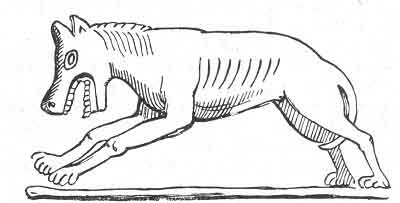
Sacred Texts Legends & Sagas Celtic Index Previous Next


WOLF.--From a stone at St. Andrews.--Sculptured Stones of Scotland, Pl. lxi.
From Hector Boyd, Barra, who learnt it from Neil M'Neill, Watersay; and from many other old men. Neil M'Neill died ten years ago, past eighty years of age.--Castle Bay, Sept. 20, 1860.
THE russet dog and the wild dog, the fox and the wolf, were going together; and they went round about the sea shore, and they found a keg of butter, and they buried it.
On the morrow the fox went out, and when he
returned in he said that a man had come to ask him to a baptism. The fox went and he arrayed himself in excellent attire, and he went away, and where should he go but to the butter keg; and when he came home the wolf asked him what name was on the child; and he said that there was FOVEEAL (under its mouth).
On the morrow he said that a man had sent to ask him to a baptism, and he reached the keg and he took out about half. The wolf asked when he came home what name was on the child.
"Well," said he, "there is a queer name that I myself would not give to my man child, if I had him., there is MOOLAY MOOLAY (about half and half).
On the morrow he said that there was a man there came to ask him to a baptism again; and he went and he reached the keg, and he ate it all up. When he came home the wolf asked him what name was on the child, and he said that there was BOOILL EEMLICH (tack-ling, licking, or licking all up).
On the morrow he went and he said to the wolf that they ought to bring the keg home. They went, and, when they reached the keg--there was not a shadow of the butter in it.
"Well! thou wert not without coming to watch this, though I was without coming here," quoth the fox.
The other one swore that he had not come near it.
"Thou needst not be blessing that thou didst not come here--I know that thou didst come, and that it was thou that took it out; but I will know it from thee when thou goest home, if it was thou that ate the butter," said the fox.
He went, and when he went home he hung the wolf by his hind legs, with his head dangling below him, and he had a dab of the butter and he put it under his
mouth, and if it was true, it was out of the wolf's belly that it came.
"Thou red thief!" said he, "I said before that it was thou ate the butter."
They slept that night as they were, and on the morrow when they rose the fox said,
"Well, then, it is silly for ourselves to be going to death in this way with great excess of sloth; we will reach such and such a town-land, and we will take a piece of land in it."
They reached the town-land, and the man to whom it belonged gave them a piece of land the worth of seven Saxon pounds.
It was oats that they set that year, and they reaped it, and they began to divide it.
"Well, then," said the fox, "whether wouldst thou rather have the root or the tip? thou shalt have thy two choices."
"I'd rather the root," said the wolf.
Then the fox had fine oaten bread all the year, and the other one bad fodder.
On the next year they set a crop; and it was tata root (potatoes) that they set, and the potatoes grew well.
"Which wouldst thou like best, the root or the crop this year?" said the fox.
"Indeed, thou shalt not take the twist out of me any more; I will have the crop (top) this year," quoth the wolf.
"Good enough, my hero," said the fox.
Then the wolf had the potato tops again, and the fox the potatoes. Then the wolf used to keep stealing the potatoes from the fox.
"Thou hadst best go yonder, and read that name
that I have in the hoofs of the gray mare," quoth the fox.
Away went the wolf, and he began to read the name; and on a time of these times the white mare drew her leg, and she cast the head off the wolf.
"Oh!" said the fox, "it is long since I heard it. I would rather be a clerk than be reading a book."
He went home, and the wolf was not putting trouble upon him any more.
I heard this story often myself in boyhood. There is some portion of dialogue that I remember, not in this version. When the fox speaks to the wolf about the christening, the conversation goes on in this manner
Madadh Ruadh. Och! heun! thall.
Madadh Alluidh. Dé tha thu 'faicinn ann.
Madadh Ruadh. Tha iad gam iarraidh gu goisdeachd.
Madadh Alluidh. Och, och, ann d' theid thu ann.
Madadh Ruadh. Och, och, theid.
Fox. Och! hein! yonder.
Wolf. What seest thou there?
Fox. They are asking me to sponsorship.
Wolf. Och! och! wilt thou go there?
Fox. Och! Och! I will.
H. MACLEAN.
See Norse Tales, p. 472, where the creatures are fox and bear.
The Boor and the Fiend, Grimm, No. 189. The notes in vol. iii., Grimm, shew that this is widely spread. See also No. 2, Grimm, vol. iii., where the creatures in company, in various versions, are cat and mouse, cock and hen, cock and fox.
See also stories on Proverbs, 1854, London.
"Send not the cat for lard." The actors are a kitten and a rat; the scene, a belfry and a garret.